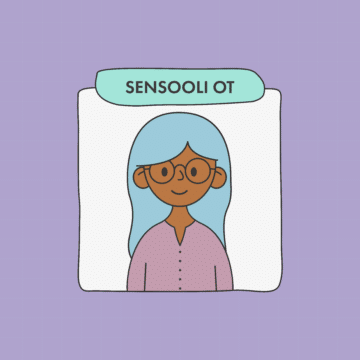
Before we delve into the specialism of an OT (occupational therapist) that has undergone specialist sensory training, let’s first understand what an OT does.
The occupational therapist’s role is to support people of all ages to participate or even re-engage with activities (occupations) that enable them to participate in life. This can range from learning, working, playing, caring for themselves or someone they are responsible for, and a range of other activities. There are many specialties within the OT field, some choose to work with those who have had a brain injury, a debilitating accident, or as in this case, those who have challenges with their senses.

For those that decide they want to specialise in sensory processing, they must undergo rigorous postgraduate training in what is known as ‘sensory integration’.
This university-accredited training does not just cover the complex neuroscience behind the senses, but also the scientific evidence and the practical aspects of how to properly assess a person’s sensory processing challenges in order to design a program of support to help them achieve their goals. This is done with interventions and strategies that provide that person with the sensory input they need. This can often involve working with a range of people connected to the individual such as the immediate and wider family, school, carers, or the workplace.
This qualification is not just a few hours of training on the internet! It involves completing a high number of clinical hours under the supervision of an advanced sensory practitioner. To practice sensory integration you must have a postgraduate certificate in sensory integration. An advanced practioner will have a postgraduate diploma or MSc.
You may have heard of Ayres sensory integration – this is what the training is based on developed by the pioneer Dr Jayne Ayres who first introduced the concept.
This is not always easy. The number of SI trained occupational therapists is somewhat limited and varies across the country.
You can gain an NHS referral via your GP, school, social services or even self-refer. You may find, depending on your area, that these services are limited to those with a formal diagnosis or there may be other criteria you are required to meet to access this type of qualified practitioner via the NHS.
This can be extremely frustrating, so your other option is to go privately. A quick google will find you who maybe local to you. At Sensooli we also offer a private OT service with qualified SI practitioners, who will work with you remotely to help you achieve your goals. You can book a free strategy call with them to find out if this would be helpful and meet your needs.
You will have a 30 minute conversation with a fully vetted, SI-qualified and experienced occupational therapist, who will listen to your challenges and make appropriate recommendations.
They will ask you questions to discuss things like:
Your therapist will then create a Sensory Action Plan with you and advise you on the most appropriate next steps to take.
Book a FREE Sensory Strategy Call with an Occupational Therapist
Sensory Matters Podcast
Free Sensory Support Community
Can Chewigems Help Keep Your Teeth Clean?